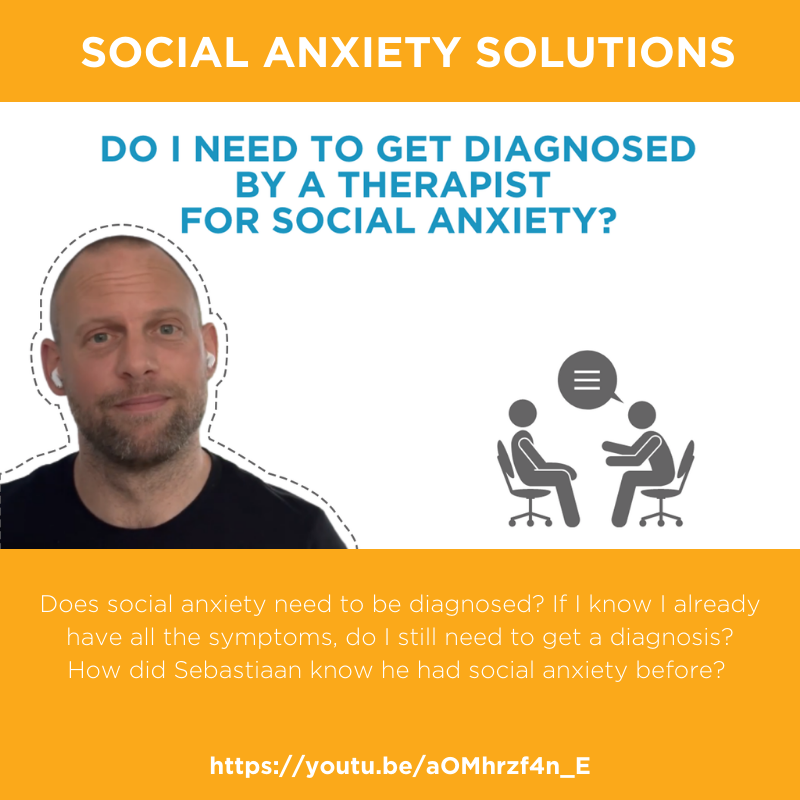SUMMARY
Does social anxiety need to be diagnosed?
If I know I already have all the symptoms, do I still need to get a diagnosis?
How did Sebastiaan know he had social anxiety before?
In this episode, Sebastiaan addressed these questions.
He gave insights on what it means to get an assessment of social anxiety.
He also shares his personal experience on how he discovered he was suffering from social anxiety.
Watch until the end of the video as he speaks of how going through the #JourneyToSocialConfidence could positively impact your life overall.
Want to start chipping away the layers of your social anxiety?
Stay tuned for the next 30 Day Social Confidence Challenge.
This FREE program helped thousands of people significantly reduce their social anxiety suffering.
Hard to believe? Watch the video here:
https://bit.ly/socialconfidencechallenge
FULL TRANSCRIPTION
Do I need to get diagnosed by a therapist for Social Anxiety?
Hey, this is Sebastiaan from social-anxiety-solutions.com
This is a question that I got, and I’ll read it out to you specifically; then, I’ll answer it.
Is it necessary to get diagnosed by a therapist for Social Anxiety? I already know I have all the symptoms. How was it for you, Seb? How did you know you had it before?
Hi, thanks for your question.
First of all, is it necessary to get diagnosed to determine that you have social anxiety? No.
Was I ever diagnosed? No.
But my mentor who is a psychotherapist, who’s also a tapping expert, and one of the wisest people I know. And also, the person that a lot of therapists go to for advice when they don’t know what to do with their clients says that it’s good to get a diagnosis because then you know what it is that you’re dealing with. Because you might very well be dealing with social anxiety, but you’re also dealing with something else (i.e., depression, bipolar or obsessive-compulsive disorder, etc.)
Not saying that is the case. But if you’re dealing with something else, and you’re only focusing on social anxiety, you’re missing the boat, and you’ll be hampering your progress.
That’s why, if you know exactly what you’re dealing with, that can be very helpful.
Now that brings up the following for most people, ‘oh, I don’t want to be diagnosed. I have a particular condition because then, that means there’s something wrong with me. And if you go to the therapist, you’re crazy or whatever’ ~ that’s outdated nonsense thinking, get that out of your head. That’s not how things are anymore these days.
It’s slowly but surely getting to the point where it’s normal and accepted and even cool to have a particular therapist. In my friend group, at least.
It’s cool to see a therapist because it means ‘wow, this person cares about his mental and emotional health, this person understands that the way he thinks, feels, and behaves makes a difference in the world and your inner world.’
So it’s intelligent to work with the assistance of someone else, rather than Oh, look at him, he needs a therapist.
Now, ‘look at him. He thinks he doesn’t need a therapist, but clearly, he does.’ Right?
That’s different.
So that’s the first thing I would say.
It can be very helpful to get a particular diagnosis.
Now then, I’m not saying you should, but it’s just a good option because then you know what you’re dealing with.
Now, if it then indeed is social anxiety, then you can attack it. Or you can address that particular thing.
You might be focusing all your attention on social anxiety, where actually there’s a depression lying underneath. You need to get support for that depression.
I don’t know what the case is. But there you go.
Then how was it for me? How did I know I had it before?
You know what? I actually didn’t know that I suffered from social anxiety until I was in the process of resolving a fair bit of it already until I already had made quite a bit of progress.
I actually was dealing with lots of insecurity that I knew and lots of anxiety that I knew. It was initially for me started out with something called Approach Anxiety. Because I was 18- 22 for like four or five years, I studied all this pickup artists stuff.
By the way, I don’t recommend it. There is some good stuff in there. But there’s a lot of unhealthy stuff in there.
Though I can’t really talk about it because I haven’t seen any of it for about 10 years and it probably has evolved as well.
But back then, it wasn’t the healthiest stuff because of a lot of the things they’re teaching.
But one of the things in there is that they talked about approach anxiety, and that is when anxiety would show up, whenever you were about to approach a girl.
Well, that was what I was trying to attack, and I wasn’t very successful in doing so.
And that wasn’t the only thing I was trying to attack, I was also trying to attack the insecurity, and as I was in the process of attacking that, I discovered ‘Wow. Like, I think I read on some forum that many people dealing with this approach anxiety problem actually have massive social anxiety.’
And then, I started looking into the symptoms of social anxiety. I’m like, Ah, okay, this is more like across the board kind of thing for me because I didn’t experience social anxiety all the time with all people. I experienced it in specific social situations.
And I did experience it in the vast majority of social situations.
For example, when I was with my mom, sister, or brother, I was totally fine.
See? So I knew there was something off.
Anyway, once I discovered that, I started addressing that.
Now, if I knew what I know now, I would have, at that time, probably got a diagnosis to see what it is that I was dealing with because I personally, actually, was dealing with other stuff too. But social anxiety was a really big one for me.
So, to summarize, do you need to get diagnosed? No.
Is it probably very helpful and smart to do? Probably yes.
Does that mean anything bad if you get a diagnosis? No. It’s just an assessment of how things are at this moment in time.
If you want to be careful because the mainstream understanding is that you don’t overcome it. And then you hear from this person – this is something you go learn to live with, you can’t overcome it. So in Holland, we say neem dat met een korreltje zout (take that with a grain of salt.)
So that’s what they experience because that’s the mainstream. And they have to say that because that’s what is true for the mainstream.
But I can tell you, I have very severe social anxiety, and that is not there anymore. And I’m not the only one in that. So it’s possible.
Is it easy? No. But you consistently make progress, you start chipping away at the layers of the social anxiety, and there’s so much that you discover as you go on that journey. Because not only does the anxiety start to reduce and reduce and reduce until it’s not there anymore, you’re working on the deeper underlying issues.
So you’re improving your self-acceptance, which makes you more easygoing, more chill, and makes you nicer, makes you find other people nicer because you don’t project your negative self-judgments onto other people, you get along with people better, you connect on a deeper level with people.
You improve your self-esteem, so you feel better about yourself, you feel more confident moving forward in particular…well in any area, because your self-esteem you feel about you, is what you take anywhere.
Generally, those fears all start to reduce or are not there. You just live a much more relaxed and at ease life.
So social anxiety is one of these blessings in disguise. But it takes a while before you know you get to the blessing. But it’s so worth it. I can tell you.
I hope that’s helpful. And thank you for your question.
And this is Sebastiaan from social-anxiety-solutions.com
Bye for now.
If you experience Social Anxiety, click below to receive the FREE “7 Secrets to Social Confidence” Mini Course!
- How To Stop Worrying - January 17, 2024
- How to Reduce Facial Blushing with EFT Tapping? - June 29, 2023
- Are You Scared to Get Anxious? Here’s how to fix it! - June 16, 2023




